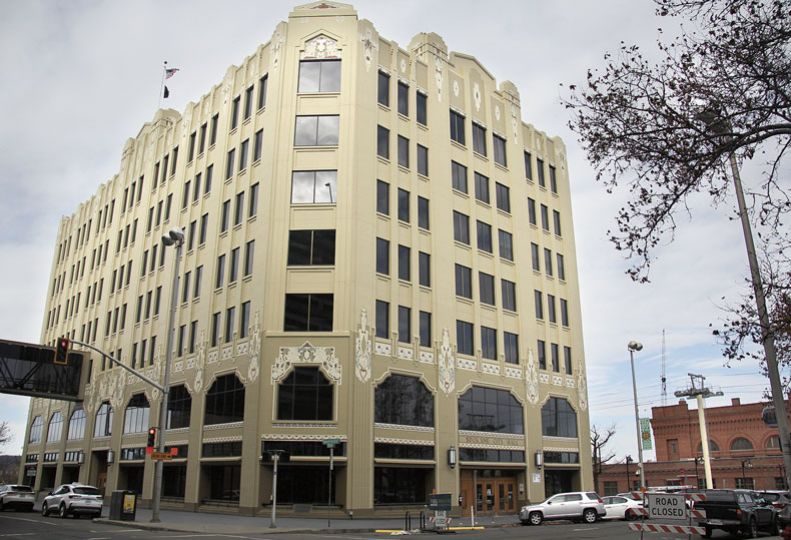
Home » Fighting for downtown Spokane
Fighting for downtown Spokane
Business leaders advocate for keeping City Hall in core as council studies options for its facilities

February 16, 2023
A proposal to relocate Spokane’s City Hall outside of the city’s downtown core to East Central Spokane has some business professionals and stakeholders dismayed at the lack of public involvement up to this point and worried about the consequences such a move would have on future development and investment opportunities.
Emilie Cameron, president and CEO of Downtown Spokane Partnership, says downtown stakeholders believe that City Hall belongs in Spokane’s core as a signal of the city’s dedication to downtown and as a source of revenue.
City Council’s Feb. 13 agenda documents included Integrus Architecture PS’s fee proposal for the Premera campus feasibility study, which identifies potential locations the city can use on the three-building Premera campus.
While Council President Breean Beggs has been quoted as saying the chances that City Hall would move to the East Spokane complex are remote, the proposal suggests that the city’s courts and clerks’ offices could move to a three-story, 41,000-square-foot building on the Premera campus. A loading dock, along with training spaces and additional office areas, could go in a two-story, 20,000-square-foot office building, and a 42,000-square-foot split-level building onsite could accommodate a new City Hall headquarters facility.
No action was taken at the Feb. 13 council meeting regarding the contract with Integrus Architecture to assess the feasibility of the Premera campus for the city’s use.
“The news that there were any conversations to explore moving City Hall out of downtown came as a surprise, and that’s a point I’ve heard a lot of members saying,” Cameron says. “First and foremost, there’s a general consensus that City Hall needs to stay in downtown. It’s a symbol of the city’s commitment to downtown and a symbol of our identity and our community pride.”
Dave Black, CEO of Spokane-based commercial real estate brokerage NAI Black, concurs. He says, “There really haven’t been any conversations about City Hall moving in the community. It hasn’t been a transparent situation. To move City Hall out of downtown Spokane is a ridiculous notion, in my opinion, and there’s plenty of other real estate around to look at.”
Any potential City Hall relocation should include input from the public, both Cameron and Black say.
Black says, “A vote without public discussion and discourse is just an abuse of power. It sends the wrong message ... that this City Council is not interested in continuing to make downtown the gem that it has been in the past.”
Brian Coddington, director of communications and marketing for the city of Spokane, agrees public input is necessary and says a timeline and process for community engagement is underway.
He says the mayor’s office and City Council are discussing a process and timeline for clearly defined expectations about what the community can expect from the relocation proposal.
Coddington says it likely will take months to evaluate the current facility and to gather all potential relocation options.
“We expect in the next several weeks to have a process pretty well sketched out that would include timelines,” he says.
City Hall has been located in one of three different buildings in the downtown core since the city was first established, but after pandemic-related safety measures sent many city employees home to work, City Council members are now questioning the best use of the 156,700-square-foot, eight-story City Hall building, and are exploring options to relocate.
Coddington says a space utilization study by Spokane-based Integrus Architecture will determine the feasibility of the Premera Campus, located on the eastern edge of Spokane at 3900 E. Sprague, to be a new home for both City Hall and the city’s municipal courts.
Before potential relocation options are decided, however, the amount of space the city currently has—and what it will need to function in the future—needs to be determined, Coddington says.
“The first thing we need to know is how many people are using City Hall and what types of space they need to do their work,” he says. “That’s what the space utilization study will do.”
Coddington says that before the pandemic, City Hall was full of people who worked exclusively in the office, with the exception of those who have field jobs.
“As part of the study, the city needs to understand how people are doing their jobs, whether they’re doing them physically onsite, or if they’re being done in a remote or hybrid capacity to be able to really understand the type of use that’s needed at City Hall,” he says.
Black says that until the study is complete, “We can’t talk about where City Hall should move without doing an analysis of how many square feet they need, who needs to be at the office, who needs to work in the field, and who will work from home.”
Cameron says the economic output in downtown drives tax revenue that supports necessary services across the city and is another reason to consider downtown properties for a relocation of City Hall.
“It’s a sales tax revenue source, utility tax and property tax, those are the things that really drive that general fund that enable necessary services across our city,” she says.
Black says many spaces in downtown Spokane could accommodate the city’s relocation, but he’s hesitant to name any sites until the city’s needs are clear.
Similarly, Cameron says, “I think we can all appreciate … about just how much the pandemic impacted budgets, utilization, and looking at spaces in a new way. But there are many locations downtown that could be a unique opportunity as they continue to evaluate the needs for City Hall. If it’s not maintaining the current building, there are definitely opportunities in the downtown core that should be explored.”
Coddington explains that Premera’s campus was considered as an option to relocate the city’s municipal court services due to space constraints and safety concerns at its current facility. The city’s court system is located north of downtown in the Public Safety Building, at 1100 W. Mallon.
As previously reported by the Journal, Mountlake Terrace, Washington-based Premera Blue Cross plans to vacate the East Sprague campus to build a new office building in Kendall Yards.
Coddington says the space utilization study has been underway since the fall and is expected to wrap up in early April.
He adds that Spokane Mayor Nadine Woodward is taking a step back to gather more information.
“The issue is the Premera space is too large for just the municipal courts so something else has to go in there with it. We’re proposing with the council... to take a step back and really understand from a more comprehensive perspective what the facility needs are for the municipal government.”
Cameron says that keeping City Hall downtown will demonstrate to developers and investors that the city has confidence in downtown’s future.
“Downtown is a compact area, however, the economic activity here is significantly higher per square mile than you would see in other parts of the city or region,” Cameron says. “By Spokane moving City Hall out of downtown, the message it signals to the investment community and those who are still here making an investment and working in downtown … is that the city has lost confidence in downtown. And if the city’s no longer going to invest, then should I?”
The Spokane City Hall building has been located at the northwest corner of Spokane Falls Boulevard and Post Street, at 808 W. Spokane Falls Blvd., since 1981. Cameron says it’s more than just a building.
“Downtown is literally and figuratively the center of the greater Spokane region, and it’s a testament that the headquarters of city government are in and have been in downtown for over 120 years,” she says.
Latest News Real Estate & Construction Government
Related Articles
Related Products


![Brad head shot[1] web](https://www.spokanejournal.com/ext/resources/2025/03/10/thumb/Brad-Head-Shot[1]_web.jpg?1741642753)


![Final renderings building aerial cropped[2] web](https://www.spokanejournal.com/ext/resources/2025/03/13/thumb/Final-Renderings-Building-Aerial-cropped[2]_web.jpg?1741900849)